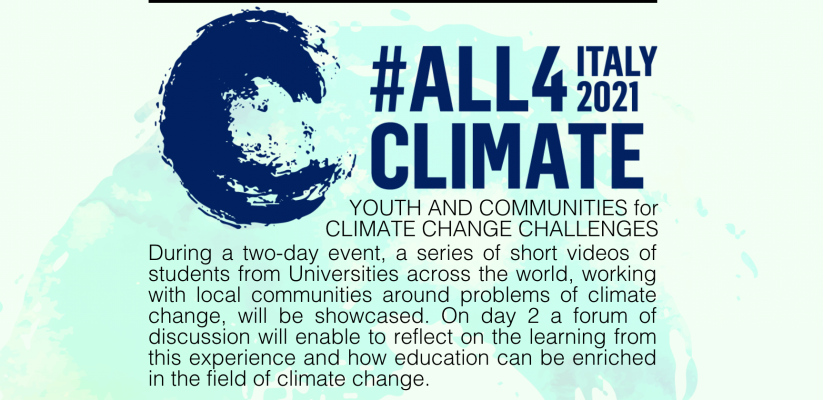‘Youth and communities for climate change challenges’ is an initiative launched by ILAUD, the International Laboratory of Architecture and Urban Design, in partnership with the UNESCO Chair in Urban and Regional Planning for Sustainable Local Development, to support Youth4Climate, with the participation of Universities from all continents.
Youth4Climate is part of the process of involvement of young people with the United Nations Youth Climate Summit. The event offered young people opportunity to develop concrete proposals for All4Climate Italy 2021, the Pre-COP26 series of initiatives held in Milan ahead of COP26 in Glasgow.
The aim of the ILAUD-Y4C Forum (27-28 September 2021) was to show a diverse range of climate-related research projects (video recordings are available here) prepared by students from schools of architecture, urban planning and related disciplines from all over the world (Mexico, Brazil, USA, Germany, South Africa, UK, Italy, Israel, India, Russia, Japan, New Zealand), reflecting on climate change challenges particularly for local communities. Each University involved have been asked to present a meaningful initiative of urban sustainability addressing climate change with the active participation of students, showing their own specific and context-based approach to the topic proposed. The format was a video of approximately ten minutes.
The University of Westminster participated with a student-led video on ‘Regenerating the Lea River Valley’ in East London. This project is the result of the so-called Climate Urbanism Studio led by Dr. Giulio Verdini and Dr. Corinna Dean that was presented at the I4C IPCC / UN-HABITAT / GCoM Conference (Recorded Session: Integrated, Holistic Approach to Planning and Collaborative Governance for more Climate-Resilient Cities) on 12 October 2021 , and will be presented at the Sustainability Month Event on 20th October 2021 in London. Students from the University of Westminster involved: Marie Kaune, Mugel Khalafalla, Cindy Duong, Iliyan Topalov, Emanuele De Angelis (from BA Designing Cities of the School of Architecture and Cities) and Hunter Christersen, Angelica Bizzotto, Suzanne Crombag, Mohamed Al-Kaf, Reeve Isaacs (from the School of Media and Communications).
The ILAUD Forum recognises as starting point the urgent need to innovate our teaching and research practice and face more effectively big societal challenges. The pandemic has been a warning of the need to develop, very rapidly, resiliency in the face of dramatic changes, and adapt teaching models to new situations, both in terms of ways of delivery and contents updating. Climate change is the next big challenge that the world is facing, and COP26 in Glasgow will be a platform to reflect on how the post-pandemic recovery will address the climate emergency. Therefore, this research addresses ways in which it is possible to innovate our curricula, often with limited resources, to address these global challenges.
One of the main outcome of the project is that programmes in the field of architecture and urban planning, which are traditionally already focused on practice-oriented works, are exploring the advantages to deal with local communities in their external exchanges. In particular the learning coming from disadvantages or marginalized communities allow them to explore a wider and more diverse range of topics, which are central to the sustainable development of cities in the futures. For example the centrality of understanding notions of climate justice and who is really paying for the cost of the current model of development can help reduce the negative impacts on affected communities; the importance of rediscovery indigenous knowledge is an essential component, often neglected, in adapting cities to global changes or to mitigate more effectively the impact of climate change. On the other hand, students are also confronted with the inherent contradictions of dealing with local communities, which might be more considerate of their socio-economic challenges, rather than grand societal challenges like climate change, perceived as distant. At the same time, community activism in the climate field can motivate students well beyond what Universities can do.
This is in line with what Greta Thunberg said at the Youth4Climate Meeting in Milan on the 28th September 2021: ‘You cannot solve a crisis that you don’t fully understand, and as long as we ignore equity and historic emissions (…) we won’t get anywhere (…) The climate crisis is a symptom of a much larger crisis: the sustainability crisis, the social crisis, a crisis of inequality that dates back to colonialism and beyond, a crisis based on the idea that some people are worth more than others, and therefore have the right to exploit and steel other people’s land and resources, and it is very naïve to believe that we can solve this crisis without confronting the roots of It
(See the video: https://twitter.com/GretaThunberg/status/1442860615941468161?s=20).
- CLIMATE JUSTICE & CITIES - March 1, 2022
- ALL4CLIMATE #MILAN PRE-COP26 - October 14, 2021
- PODCAST #4: UNIVERSITIES AS LEADERS IN SUSTAINABILITY, FIGHTING CLIMATE CHANGE - February 26, 2021
